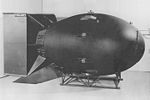- Nuclear strategy
-
Nuclear weapons 
History
Warfare
Arms race
Design
Testing
Effects
Delivery
Espionage
Proliferation
Arsenals
Terrorism
Anti-nuclear oppositionNuclear-armed states United States · Russia
United Kingdom · France
China · India · Israel
Pakistan · North Korea
South Africa (former)Nuclear strategy involves the development of doctrines and strategies for the production and use of nuclear weapons.
As a sub-branch of military strategy, nuclear strategy attempts to match nuclear weapons as means to political ends. In addition to the actual use of nuclear weapons whether in the battlefield or strategically, a large part of nuclear strategy involves their use as a bargaining tool.
Some of the issues considered within nuclear strategy include:
- Under what conditions does it serve a nation's interest to develop nuclear weapons?
- What types of nuclear weapons should be developed?
- When and how should such weapons be used?
Many strategists argue that nuclear strategy differs from other forms of military strategy because the immense and terrifying power of the weapons makes their use in seeking victory in a traditional military sense impossible.
Perhaps counterintuitively, an important focus of nuclear strategy has been determining how to prevent and deter their use, a crucial part of mutual assured destruction.
In the context of nuclear proliferation and maintaining the balance of power, states also seek to prevent other states from acquiring nuclear weapons as part of nuclear strategy.
Contents
See also
Weapons of
mass destruction
By type Biological, Chemical, Nuclear, Radiological By country Proliferation Biological, Chemical, Nuclear, Missiles Treaties List of treaties  Book ·
Book ·  Category
Category- Military Strategy
- Counterforce, Countervalue
- Cost-exchange ratio
- Decapitation strike
- Deterrence
- Doctrine for Joint Nuclear Operations
- Fail-deadly
- Force de frappe
- First strike, Second strike
- Game theory & wargaming
- Madman theory
- Massive retaliation
- Minimal deterrence
- Mutual assured destruction (MAD)
- Assured destruction
- No first use
- National Security Strategy of the United States
- Nuclear blackmail
- Nuclear proliferation
- Nuclear utilization target selection (NUTS)
- Single Integrated Operational Plan (SIOP)
- Strategic bombing
- Tactical nuclear weapons
- Bernard Brodie
- Herman Kahn
- Stanley Kubrick's Dr. Strangelove (1964), a film satirizing nuclear strategy.
Bibliography
Early texts
- Brodie, Bernard. The Absolute Weapon. Freeport, N.Y.: Books for Libraries Press, 1946.
- Brodie, Bernard. Strategy in the Missile Age. Princeton: Princeton University Press, 1959.
- Dunn, Lewis A. Deterrence Today – Roles, Challenges, and Responses Paris: IFRI Proliferation Papers n° 19, 2007.
- Kahn, Herman. On Thermonuclear War. 2nd ed. Princeton, N.J.: Princeton University Press, 1961.
- Kissinger, Henry A. Nuclear Weapons and Foreign Policy. New York: Harper, 1957.
- Schelling, Thomas C. Arms and Influence. New Haven: Yale University Press, 1966.
- Wohlstetter, Albert. "The Delicate Balance of Terror." Foreign Affairs 37, 211 (1958): 211–233.
Secondary literature
- Baylis, John, and John Garnett. Makers of Nuclear Strategy. London: Pinter, 1991. ISBN 1-85567-025-9.
- Buzan, Barry, and Herring, Eric. "The Arms Dynamic in World Politics". London: Lynne Rienner Publishers, 1998. ISBN 1-55587-596-3.
- Freedman, Lawrence. The Evolution of Nuclear Strategy. 2nd ed. New York: St. Martin's Press, 1989. ISBN 0-333-97239-2 .
- Heuser, Beatrice. NATO, Britain, France and the FRG: Nuclear Strategies and Forces for Europe, 1949–2000 (London: Macmillan, hardback 1997, paperback 1999), 256p., ISBN 0-333-67365-4
- Heuser, Beatrice. Nuclear Mentalities? Strategies and Belief Systems in Britain, France and the FRG (London: Macmillan, July 1998), 277p., Index, Tables. ISBN 0-333-69389
- Heuser, Beatrice. "Victory in a Nuclear War? A Comparison of NATO and WTO War Aims and Strategies", Contemporary European History Vol. 7 Part 3 (November 1998), pp. 311–328 [1].
- Heuser, Beatrice. "Warsaw Pact Military Doctrines in the 70s and 80s: Findings in the East German Archives", Comparative Strategy Vol. 12 No. 4 (Oct.–Dec. 1993), pp. 437–457 [2].
- Kaplan, Fred M. The Wizards of Armageddon. New York: Simon and Schuster, 1983. ISBN 0-671-42444-0.
- Rai Chowdhuri, Satyabrata. Nuclear Politics: Towards A Safer World, Ilford: New Dawn Press, 2004.
- Rosenberg, David. "The Origins of Overkill: Nuclear Weapons and American Strategy, 1945–1960." International Security 7, 4 (Spring, 1983): 3–71.
- Schelling, Thomas C. The Strategy of Conflict. Cambridge: Harvard University Press, 1960.
- Smoke, Richard. National Security and the Nuclear Dilemma. 3rd ed. New York: McGraw–Hill, 1993. ISBN 0-07-059352-3.
References
Categories:- Nuclear strategies
- Nuclear warfare
Wikimedia Foundation. 2010.
